|
|
|
Sort Order |
|
|
|
Items / Page
|
|
|
|
|
|
|
| Srl | Item |
| 1 |
ID:
124113
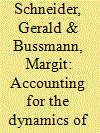

|
|
|
|
|
| Publication |
2013.
|
| Summary/Abstract |
This article presents the Konstanz One-Sided Violence Event Dataset (KOSVED) which allows researchers to study the dynamics of civilian abuse in 17 civil wars. The dataset provides, based on a multitude of sources, detailed information on the number of civilians killed or harmed by government or rebel troops. Where information is available, KOSVED also documents the dates of these events as well as the identities of the perpetrators and the means used in terrorizing the civilian population. The authors argue that the content analysis of news reports offers relatively accurate figures on those events that the perpetrators cannot hide from the public and that receive prominent media attention. Presumably, such information motivates potential short-term retaliatory acts by the group that has been the target of one-sided violence. The analysis suggests that, over the course of a conflict, almost all actors attack unarmed citizens, although to radically different degrees and relying on different means.
|
|
|
|
|
|
|
|
|
|
|
|
|
|
|
|
| 2 |
ID:
077069
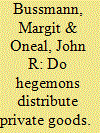

|
|
|
|
|
| Publication |
2007.
|
| Summary/Abstract |
According to power-transition theory, war is most likely when the leading state is challenged by a rapidly growing, dissatisfied rival. Challengers are said to be dissatisfied because the hegemon manages the status quo for its own benefit, rewarding its allies and penalizing rivals. We assess the leading state's ability to distribute the private goods of peace, victory in war, and economic prosperity. States with alliance portfolios similar to the hegemon's are not protected from aggression; nor do they grow more rapidly than countries with which the leading state is not closely allied. The dominant power's allies are more apt to win defensive wars, although the means by which this is accomplished are unclear. On balance, our results call into question the ability of the leading state to engineer satisfaction by distributing private goods. Like hegemonic-stability theory, power-transition theory exaggerates the influence of the leading state over the international system.
|
|
|
|
|
|
|
|
|
|
|
|
|
|
|
|
| 3 |
ID:
143541
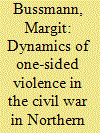

|
|
|
|
|
| Summary/Abstract |
The analysis aims at detecting patterns in the use of violence against the civilian population in the Civil War that was fought in the North of Uganda by the Lord’s Resistance Army (LRA), an armed group that is known for its atrocities. One-sided violence increased with a decline in popular support and was related to the support of an external patron who influenced the relative military strength. The results of the quantitative analysis indicate that the LRA’s use of violence varied systematically with battle-related activities and was higher after the LRA had to suffer losses in combat.
|
|
|
|
|
|
|
|
|
|
|
|
|
|
|
|
| 4 |
ID:
094691
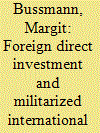

|
|
|
|
|
| Publication |
2010.
|
| Summary/Abstract |
Liberals claim that countries avoid conflict in order not to disrupt economically beneficial exchange. The statement that economic integration reduces the likelihood of conflict is largely based on the effects of trade. A similar rationale can be applied to economic interdependence in the form of international capital exchange. A state is expected to avoid political risk, especially severe forms such as militarized disputes, in order not to deter investors. This study tests, on the dyadic and monadic levels of analyses, whether the liberal peace proposition holds when economic integration is operationalized as foreign direct investment (FDI) stocks, inflows, and outflows. The results for the years 1980-2000 indicate that inflows and stock of foreign investment reduce the risk of an outbreak of a fatal dispute, regardless of whether they are tested in a single equation or a simultaneous equation model. Thus, reverse causality does not bias the pacifying effect of foreign investment inflows and stock. The results also support the underlying notion of the commercial peace that militarized conflicts inhibit foreign investment. The onset of a fatal conflict reduces FDI inflows, and, if tested in a two-stage instrumental variable approach, FDI stock, the most complete measure of economic integration through foreign investment. Accounting for endogeneity seems particularly important when analyzing the link between the onset of fatal disputes and the outflow of FDI.
|
|
|
|
|
|
|
|
|
|
|
|
|
|
|
|
| 5 |
ID:
067216
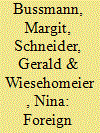

|
|
|
| 6 |
ID:
174240


|
|
|
|
|
| Summary/Abstract |
Reports about mass atrocities are often accompanied by demands for action against the perpetrators. Mediation allows third parties to demonstrate their active involvement against civilian victimisation. However, whether mediators are successful in contributing to lower levels of one-sided violence is far from clear. Conflict actors might continue or even intensify violence to enhance their bargaining position during peace talks. Based on our tests with monthly data for intrastate conflicts in Africa we find no support for the expectation that one-sided violence declines in the aftermath of mediation onset. Instead, we observe rather an increase in civilian victimisation.
|
|
|
|
|
|
|
|
|
|
|
|
|
|
|
|
| 7 |
ID:
190099
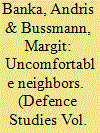

|
|
|
|
|
| Summary/Abstract |
To what ends do allies employ military exercises? In order to further our understanding regarding the logic and utility of military drills, this paper focuses on NATO’s eastern flank. Specifically, with the help of newly compiled data, we tracked two decades of exercises in the Baltic states. Our analysis speaks to the fact that the size, tempo, and character of military training events in this region have manifestly changed. In the early 2000s, military drills were primarily conceived as a mechanism to modernize Baltic armed forces and ensure their adequacy to NATO membership standards. The 2014 Crimea crises, however, dealt a serious blow to the regional order. This event was the primary driver behind a considerable spike in the overall exercise numbers. At the same time, we observe that it was not only a mere quantitative shift that transpired. From parachute drops into remote areas, rehearsals of river crossings to moving of combat power via narrow land corridors, the staging of military exercises after 2014 were overhauled into events that accentuated NATO’s reinforcement capabilities. In this context, military exercises can be seen as a crucial element to credibly signal capacity and resolve within the concept of deterrence by reinforcement.
|
|
|
|
|
|
|
|
|
|
|
|
|
|
|
|
| 8 |
ID:
076507
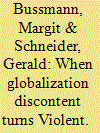

|
|
|
|
|
| Publication |
2007.
|
| Summary/Abstract |
One of the disputed consequences of global economic integration is the possible effect that foreign economic liberalization exerts on social cohesion. Proponents of commercial liberalism see stabilization as an indirect consequence of growing economic interdependence, while globalization critics are much more skeptical. They expect, at least during the liberalization process, destabilizing effects. We examine in this paper the contradictory claims in the light of what we call the distributional theory of civil war. This variant of commercial liberalism qualifies the peace-through-trade hypothesis and expects, based on political economy models of trade policy making, that the redistributive struggle associated with foreign economic liberalization can culminate in violent forms of protest. We demonstrate that a higher level of economic openness is indeed associated with a lower risk of civil war. At the same time, economic liberalization increases the chances of instability weakly. None of the following factors are found to exert any compensatory influence on instability: social spending, foreign aid, and financial flows from the International Monetary Fund. Discontent over the process of globalization is thus a destabilizing force despite the pacifying effect that the level of economic integration exerts.
|
|
|
|
|
|
|
|
|
|
|
|
|
|
|
|
|
|
|
|
|